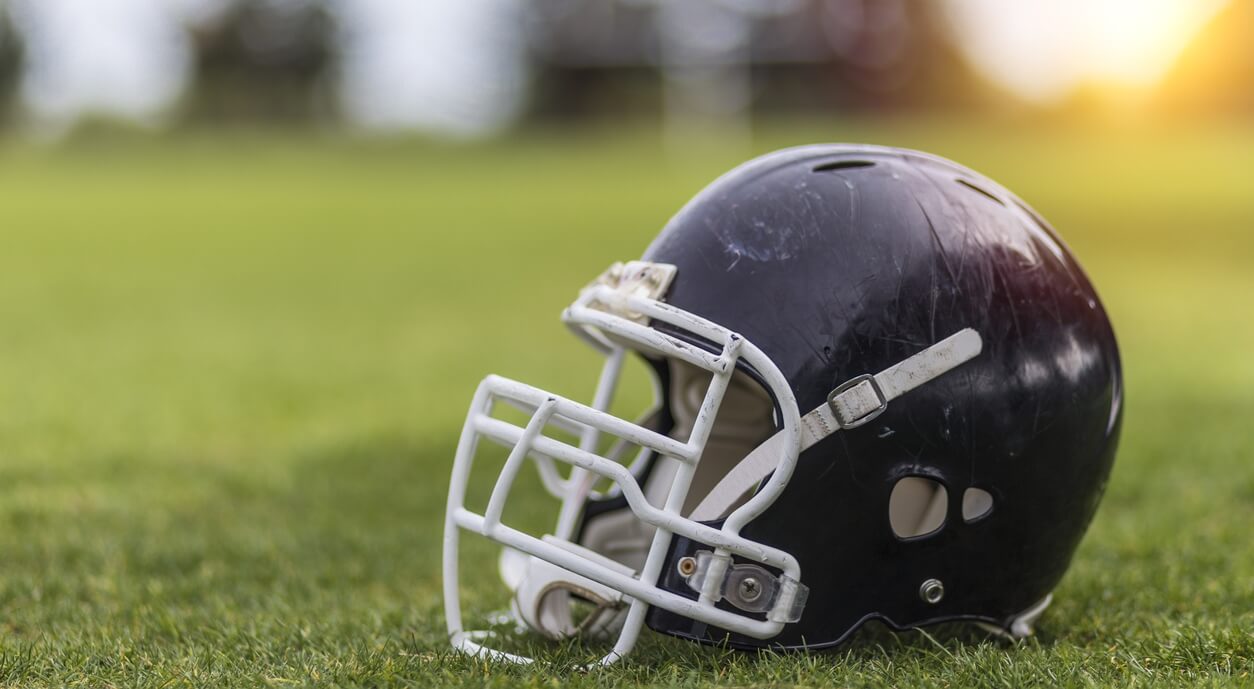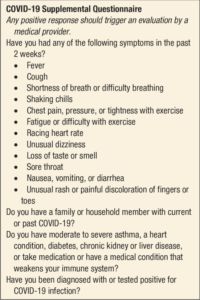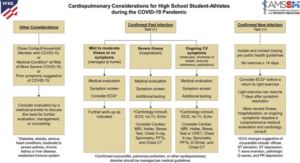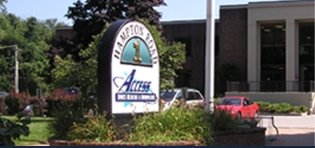
A 15-year-old expertly dribbles a soccer ball down the field, dodging defender after defender. They angle the shot to sneak just behind the goalie and sink into the net, prompting explosive cheers from the crowd.
Before the year 2020, that snapshot of a high school soccer game was perfectly normal. Today, it raises a lot of questions: Has that teenager been in contact with anyone experiencing COVID-19 symptoms? How many spectators are in the crowd? Are they wearing masks and social distancing? What precautions are the school taking to protect athletes and their friends and families?
Across the globe, we have seen businesses and schools remain vigilant and make tough, sometimes day-to-day adjustments in order to protect their communities. At Access Sports Medicine, we have also continued to monitor the CDC and local guidelines to continue safely providing care during the COVID-19 pandemic.
As schools open back up in hybrid and in-person models, questions regarding process and protocol are keeping both parents and administrators awake at night. We would like to contribute to this conversation by sharing some information regarding high school sports during COVID-19, and most important, measures that can help keep athletes safe.
Kevin Heaton, DO, at Access Sports Medicine is an active member of The American Medical Society for Sports Medicine (AMSSM). Recently, the AMSSM released an article titled “Cardiopulmonary Considerations for High School Student-Athletes During the COVID-19 Pandemic: NFHS-AMSSM Guidance Statement.” This joint guidance statement cautions athletes, parents, school administrators and athletic trainers regarding long-term impacts of COVID-19 and offers specific recommendations to follow before allowing students to resume playing sports.
This post covers their guidelines, important steps for prevention, ways to mitigate the spread of the virus and Access’ specific role in high school sport settings.
Ensuring That Student Athletes Are Healthy Enough To Play
Although many cases of COVID-19 in younger patients present mildly or asymptomatically, the virus can still cause severe inflammation and damage to the heart and lungs. Student athletes who contract COVID-19 and experience mild or moderate symptoms should still take proper precautions.
The AMSSM recommends that student athletes receive an assessment from a medical provider and an EKG to evaluate heart and lung health; those who face severe symptoms and/or are hospitalized should be released by a cardiologist before returning to physical activity.
Although we have a lack of data regarding complications in teenagers and milder cases of COVID-19, there are significant negative long-term cardiopulmonary effects in severe adult cases. In fact, approximately 20% of hospitalized patients suffer from cardiac or thromboembolic complications. These extensive health issues should encourage us to exercise caution as student athletes return to sports and exercise following a COVID-19 diagnosis and continue to play sports amid the pandemic. Of course, this starts with prevention.
Prevention – COVID-19 Supplemental Questionnaire
The NFHS (National Federation of State High School Associations) task force teamed up with the AMSSM to prepare a screening questionnaire.
The survey pictured below provides a set of symptoms for athletic directors to present to each student athlete. If they answer yes to any of the following questions, then they should receive an examination and clearance from a medical provider prior to participating in high school sports.

What If A Student Athlete Has A Confirmed COVID-19 Case?
Screening questionnaires can help prevent COVID-19 from spreading. But how should we deal with COVID-19 cases and recovery? The attached diagram covers specific medical steps to take for confirmed cases, close contact with confirmed cases and suspicious symptoms. Specifically, the following scenarios:
Confirmed diagnosis: After a positive COVID-19 test, student athletes should monitor ongoing symptoms that occur, should be evaluated by a medical provider and should receive written clearance before returning to sports. Depending on the severity, student athletes should consider seeking additional tests.
- Mild/moderate illness: A COVID-19 case that did not require significant medical intervention should still consider further evaluation. They may recommend seeing a specialist who can perform a test like an ECG (electrocardiogram) to rule out cardiac damage.
- Severe/hospitalized illness: Student athletes who experienced a severe case of COVID-19 or were hospitalized should undergo a comprehensive cardiac evaluation. This consultation could include an ECG, cardiac magnetic resonance imaging, a stress test or a variety of other cardiac assessments. To check lung health, pulmonary testing such as chest radiographs, spirometry, functional testing and other pulmonology consultations are also recommended.
- Ongoing symptoms: Long-term symptoms from a case of COVID-19 could indicate serious underlying issues. Student athletes experiencing continued symptoms should seek an evaluation to rule out heart and lung disorders like pneumonia, myocarditis or other cardiopulmonary disorders. These serious complications must be managed with specific medical intervention and the student athlete should not resume physical activity until they receive medical clearance from a physician.
Contact or Symptomatic Concerns: Student athletes should also seek a medical evaluation if they have been in contact with a confirmed COVID-19 patient or have not been diagnosed but are experiencing symptoms consistent with the checklist above. We also suggest medical evaluations for students who fall into “high risk” categories due to asthma, heart conditions, obesity, diabetes, chronic kidney or liver disease or a weakened immune system.

Implementing Proper Resources and Plans
Although schools are taking precautions, offering screening questionnaires and taking measures to control COVID-19, cases are still occurring in our community. Recently, Portsmouth High School closed due to a confirmed case. Since the Seacoast is still experiencing upticks in cases, the AMSSM suggests three specific steps high schools can take to help protect student athletes from contracting or spreading COVID-19 during athletic seasons.
A Daily Tracking Tool – Implementing a log can help confirm that symptoms are being properly monitored. If any of the symptoms from the questionnaire are confirmed, those student athletes should not attend school or sports and should immediately seek testing and medical evaluation.
COVID-19 Response Team – Establish a group of people to create and enforce policies and procedures that help contact trace and support safe school sessions.
Suggested Medical Evaluations for Confirmed Cases – Any student athlete who receives a positive COVID-19 test should self-isolate and follow CDC guidelines. Once they are symptom free, they should wait an additional 7-14 days, receive a medical evaluation and written clearance before resuming exercise.
The AMSSM and NFHS’ guidance statement extends beyond COVID-19 regulations and reminds schools to have an EAP (emergency action plan) for sporting events in order to properly respond to SCA (sudden cardiac arrest). With lingering symptoms from COVID-19, there is an increased risk of SCA occurring. For preparation, schools should ensure that they have:
- Developed an automated external defibrillator (AED) program
- Trained coaches, school nurses and athletic trainers on AEDs and cardiopulmonary resuscitation (CPR)
- Conducted an EAP practice drill for SCA with their staff
Access Sports Medicine’s Commitment
Access Sports Medicine has always been committed to student athletes, and we are providing additional support to help high schools during COVID-19. We have on-site, certified and licensed athletic trainers at Exeter, Timberlane, Newmarket and Raymond high schools who are actively monitoring and screening for COVID-19 in student athletes.
Access also has Cardea ECG™,” Dr. Heaton says, “This is a reliable, automated diagnostic system designed to identify cardiac conditions associated with sudden cardiac death in active youth and athletes. This ECG machine can be used to screen for cardiac complications associated with COVID-19 infection.
This device helps Access Sports Medicine provide integral medical evaluation for high school athletes who have either contracted COVID-19 or are experiencing symptoms without diagnosis. This powerful technology can help properly identify potential long-term complications and allow medical professionals to develop recommendations and plans for necessary treatment.
We hope that one day, we can all celebrate an incredible goal on the soccer field without thoughts of COVID-19 interrupting our cheers from the bleachers. Until that day, we are combatting this year’s uncertainty by continuing to provide the same exceptional level of care that we offered pre-pandemic.
We have even expanded our hours to better accommodate our patients. If you’re interested in requesting an online appointment, click here. If you have any questions or concerns and would like to contact us, please click here.

